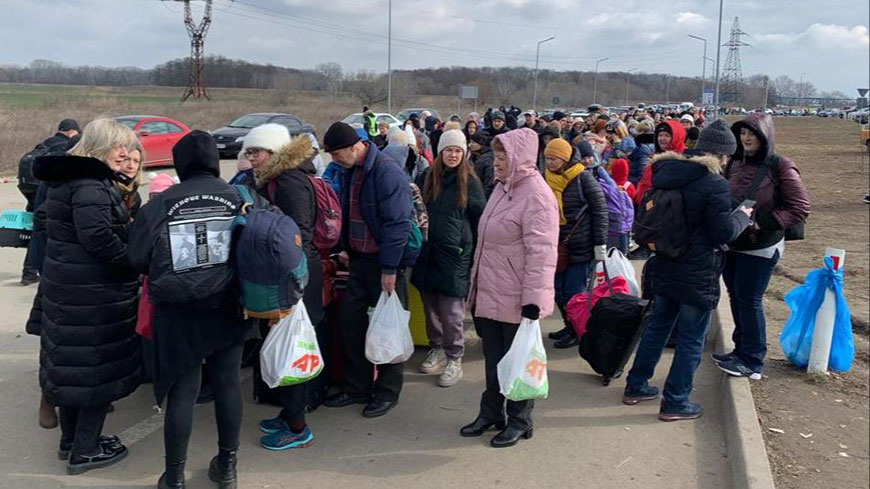“Beyond the prompt humanitarian response already provided by European states to people fleeing the war in Ukraine, more support is urgently needed to protect their human rights and to support countries of arrival, in particular the Republic of Moldova”, said today the Council of Europe Commissioner for Human Rights, Dunja Mijatović, following her three-day mission to the Republic of Moldova.
“I have met and listened to dozens of people who fled the war – in a reception centre in Chisinau, on the Ukrainian side of the border crossing near Palanca, and in other locations across the Republic of Moldova. For many of them, their first night spent in the Republic of Moldova was their first peaceful night in a long time. But confusion, anguish and trauma are clearly visible in their eyes. Their words express anger and distress. Mothers with children are worried about their immediate future. A little boy confided in me his fear of the war. Older people described how their lives have been suddenly uprooted by the shelling. People who travelled for many days and over long distances to bring their families to safety are now waiting in long lines at the border crossing. They are hopeful but weary. All those to whom I spoke are also worried about the safety and welfare of those left behind: their husbands, parents, relatives and friends, unwilling or unable to leave.”
As the Commissioner concluded her mission, the number of those who fled Ukraine reached over 2 million people according to UNHCR. Wedged between war-affected Ukraine and the European Union, the Republic of Moldova has been facing an unprecedented situation of coping with large-scale displacement. To this day, over 243,000 people have entered the country, and nearly 100,000 remained in the country at the time of the visit. Many more are waiting, in queues at the border in long lines of cars and on foot, anxious to reach safety.
The Moldovan authorities, NGOs and many ordinary citizens have stood up to the daunting challenge by mustering a humanitarian response, coordinating the provision of assistance to meet the basic needs of the arriving people, making reception centres available, and ensuring medical, psychosocial and administrative support. Since the beginning of the war, they have been dealing with a humanitarian emergency with very limited resources. “The enormous help offered to people fleeing the war in Ukraine in the Republic of Moldova and in other countries of arrival is a truly heart-warming demonstration of humanity,” added the Commissioner. “Thousands of people have come forward – volunteers, central and local government workers, civil society organisations, and ordinary people, young and old – selflessly working long shifts and going out of their way to provide help. Many NGOs, like the Casa Concordia, have rapidly refocused their ordinary activities to provide urgent humanitarian assistance, including food, clothing, safe shelter, means of communication, and toys for children.”
As the intensification of Russia’s attacks and the growing loss of civilian lives, amid continued reports of violations of human rights and international humanitarian law, prompts even more people to flee abroad in search of safety, the situation remains extremely volatile. The international community should urgently step up its assistance to the most exposed countries of arrival, in particular the Republic of Moldova. More funding and institutional support, including manpower, skill, and expertise is urgently needed, as well as longer-term economic, humanitarian and institutional support, in order to help them to urgently scale up their response as needed. It is also very important to provide support for the early identification of vulnerable persons, especially women and children – who constitute 89% of all those who fled Ukraine to the Republic of Moldova – and their protection from gender-based violence, human trafficking, and exploitation. As with previous situations of large-scale arrivals of people seeking protection, dealing with the inflow of people must not be the sole responsibility of individual countries but a European one, with human rights protection and solidarity at its centre.
In order to protect the rights of the people fleeing from Ukraine who decide to remain in the Republic of Moldova, a long-term approach will have to be adopted and strategies and integration measures envisaged in good time, including through creating opportunities for child refugees to continue their education and by offering psychological assistance to all those who need it. “Even with the enormous amount of assistance and compassion, the human consequences of this war for the people of Ukraine are unfathomable. They have been deprived of their most basic human rights and their dignity was shattered. The deep wounds inflicted by this war will take a long time to heal.”, concluded the Commissioner.
During her emergency mission, the Commissioner visited a former boarding school in Cărpineni, urgently repurposed to serve as emergency housing for people fleeing the war, and a home for mothers and children in Ruseștii Noi, managed by the Moldovan office of the NGO Casa Concordia. The Commissioner and members of her team also visited emergency reception centres for people who fled Ukraine, located at the MoldEXPO international exposition centre and the Manejul sports hall in Chisinau. Together with a delegation from the OSCE Mission in Moldova, the Commissioner travelled to Palanca in the southern area of the Republic of Moldova and visited both sides of the border crossing between Ukraine and the Republic of Moldova, as well as a temporary reception camp on the Moldovan side in Palanca. In Chisinau, the Commissioner held meetings with the Minister of Interior, Ana Revenco; State Secretary of the Ministry of Foreign Affairs and European Integration, Vladimir Cuc; the Ombudsman, Ceslav Panico, and the Children’s Rights Ombudsman, Maia Bănărescu.



